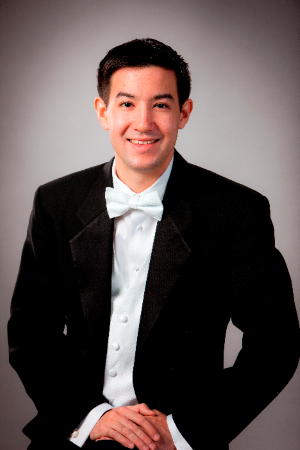Dedicated to The People of Paris
Milwaukee Symphony’s basilica concert becomes a moving tribute to France’s tragedy.
The tragic events in Paris had unfolded just hours before the Milwaukee Symphony Orchestra’s sold-out concert at the Basilica of St. Josaphat on Friday evening, and a quietly respectful mood of reflection had overtaken the audience. The evening’s program, the music of Anton Bruckner and Henryk Mikolaj Górecki, although planned months before, was uncannily prescient and altogether fitting.
The concert opened with an impassioned a cappella performance by the Milwaukee Symphony Chorus of Górecki’s Totus Tuus, Op. 60. Under the skillful direction of Lee Erickson, the chorus burst forth in a rich tone, filling the gilded and pearlescent vaults of the basilica with the devotion to Mary. Immediately after washing the space with its gloriously full resonance, the chorus reined in its considerable volume and sang meditatively, lovingly, tenderly. The Milwaukee Symphony Chorus is a masterful ensemble. Attacks were clear; there were no mumbled consonants or hissing sibilants. The choristers displayed a dynamic range that showed off everything from chill-inducing fortissimos to breathtaking pianissimos. As the last “Maria” faded away into the stillness, the audience did not break the spell right away with applause. Those few seconds of silence gave the performance the repose it deserved.
After intermission, Maestro Francesco Lecce-Chong dedicated the performance of Górecki’s Symphony No. 3, “Symphony of Sorrowful Songs,” to the people of Paris. Aptly, the third movement asks, “Where has he gone/My dearest son?/Perhaps during the uprising/The cruel enemy killed him.” This is a solemn work. It is slow, chant-like, and has an intentional lugubriousness that falls on the ears with an uncomplicated clarity. Soprano Kathryn Henry sang with magnificent color and simplicity. Her pure, shimmering voice beautifully conveyed the emotional impact and transported the music into the realm of the sublime. The composition ended with a prayer of solace: “And you, God’s little flowers/May you blossom all around/So that my son/May sleep happily.” The warm, reverberant acoustics of the Basilica of St. Josaphat worked exceedingly well here for both singer and orchestra, and the Górecki succeeded in giving listeners a sense of grace for the wounds of the day.
Sandwiched between the compositions of Górecki was the Te Deum of Anton Bruckner. Bruckner’s symphonic hymn of thanksgiving, featuring a chorus and four vocal soloists, is a typical example of his magisterial use of the brasses and his less-than-inspired use of winds and strings. The brass section was indeed up to the task of creating a wall of sound—counterpunching with the heavyweight power and splendor of the chorus—while the strings stitched the outlines of the chord structure and the woodwinds got swallowed up by the overwhelming forces. Tenor Thomas Leighton sang convincingly, but the solo quartet that also included soprano Ariana Douglas, mezzo-soprano Katherine Fili, and baritone Leroy Y. Davis alternately lost the tonal thread in the cavernous void when the orchestration dropped out or was often engulfed by the sheer mass of accompanying sound. However, this still was a great piece to hear in the basilica, and Lecce-Chong paced the work with impressive maturity. He is a remarkable talent on the podium, with the ability to give clear rhythmic signals and express sensitive musical intention.
This was Lecce-Chong’s parting concert with the MSO, as he is off to serve as assistant conductor of the Pittsburgh Symphony Orchestra. Before the second half of the concert began, violinist Ilana Setapen thanked Lecce-Chong for his talent and skill as a musician, his advocacy for classical music in the community, and his kindness. The orchestra world is often unforgiving to young conductors, and it is noteworthy that the musicians took time to publicly lavish praise on its departing associate conductor. Lecce-Chong has earned the respect of his colleagues through hard work, genuine aptitude, and sincere warmth. The MSO was obviously very thankful to have worked with him and is sad to see him go. Surely this will not be the last we hear of him—Lecce-Chong has the chops to do great things in the orchestra world.
Review
-
‘L’Appartement’ Is a Mind-Bending Comedy
 Mar 25th, 2024 by Dominique Paul Noth
Mar 25th, 2024 by Dominique Paul Noth
-
Highlands Café Is Easy to Love
 Mar 15th, 2024 by Cari Taylor-Carlson
Mar 15th, 2024 by Cari Taylor-Carlson
-
‘The Mountaintop’ Offers Very Human Martin Luther King Jr.
 Mar 11th, 2024 by Dominique Paul Noth
Mar 11th, 2024 by Dominique Paul Noth
















